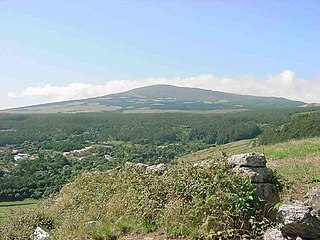
Peneda-Gerês National Park, also known simply as Gerês, is a national park in Norte Region, Portugal. Created in May 1971, it is the oldest protected area and the only national park in Portugal. It covers an area of 695.9 km2 (268.7 sq mi), occupying the Districts of Viana do Castelo, Braga, and Vila Real and bordering the Spanish Baixa Limia – Serra do Xurés natural park to the north, with which forms the UNESCO biosphere reserve of Gerês-Xurés.

Sierra de Gata is one of the main mountain ranges in the Sistema Central, Spain. The highest point is Peña Canchera.

Águas Mornas is a Brazilian municipality in the state of Santa Catarina.

The Sintra-Cascais Natural Park is a park on the Portuguese Riviera, one of the 13 Natural Parks of Portugal. While only established in 1994 as a Natural Park by the Portuguese Government, it has been protected since 1981. Its area is approximately 145 km2. The park includes the Serra de Sintra Mountain Range but extends all the way to the coast and Cabo da Roca, continental Europe's westernmost point. It contains the Castle of the Moors. Located within 25 km of Lisbon, the Sintra-Cascais Natural Park is a popular tourism area, with many different individual historical and natural sites and attractions. Sintra and Cascais are towns and municipalities in the Lisbon / Estoril Coast.

Floresta is a city in the Brazilian state of Pernambuco. It is situated at latitude 08º36'04" south and at longitude 38º34'07" west, at an altitude of 316 metres. Its population was estimated in 2020 to be 33,184 inhabitants, according to the Brazilian Institute of Geography and Statistics. It has an area of 3644.17 km2.

The Serra do Pardo National Park is a National park in the state of Pará, Brazil.
Serra Negra Biological Reserve is a Biological reserve in the state of Pernambuco, Brazil.

Tinguá Biological Reserve is a biological reserve in the Serra do Tinguá mountains, Rio de Janeiro state, eastern Brazil.

Pedra Talhada Biological Reserve is a federally administered biological reserve in eastern Brazil. It contains a remnant of the tropical Atlantic Forest biome.
Raso da Catarina Ecological Station is a strictly protected ecological station in the state of Bahia in Brazil. It lies in the Raso da Catarina ecoregion of the Caatinga biome.
Serra das Araras Ecological Station is an ecological station in Mato Grosso, Brazil. It contains a sample of the Cerrado biome.
The Protected areas of Portugal are classified under a legal protection statute that allows for the adequate protection and maintenance of biodiversity, while providing services for ecosystem that maintains the natural and geological patrimony.

Serra de Santa Bárbara is the peak of an dormant volcano in the western part of the island of Terceira, Azores, Portugal. At 1,021 m (3,350 ft) elevation, it is the highest point of the island. It is named after the village located on the coast to the south, Santa Bárbara in the municipality of Angra do Heroísmo.

Sierra de Gata is a comarca at the northern end of province of Cáceres in Extremadura, one of Spain's seventeen Autonomous Communities. The mountain range of Sierra de Gata is in the area and has given its name to the comarca. The main town is Moraleja.

The Nature Park of Terceira, or simply the Terceira Nature Park (PNTER) developed from the intention of better managing the protected areas of the island of Terceira, and was instituted by the "Secretaria Regional do Ambiente e do Mar", of the Autonomous Regional Government of the Azores. It includes an area of approximately 22% of the island classified under the International Union for Conservation of Nature's Nature Reserve designation.
The Nascentes da Serra do Cachimbo Biological Reserve is a biological reserve in the state of Pará, Brazil. The reserve protects an area in the transition between the Cerrado and Amazon biomes, supporting highly diverse flora and fauna including many endemic species. It is accessible via the BR-163 highway, and is among the federal conservation units in the Amazon Legal that has suffered most from deforestation.

Terra do Meio Ecological Station is an ecological station (ESEC) in the state of Pará, Brazil.

The Amazon Region Protected Areas Program is a joint initiative sponsored by government and non-government agencies to expand protection of the Amazon rainforest in Brazil.













